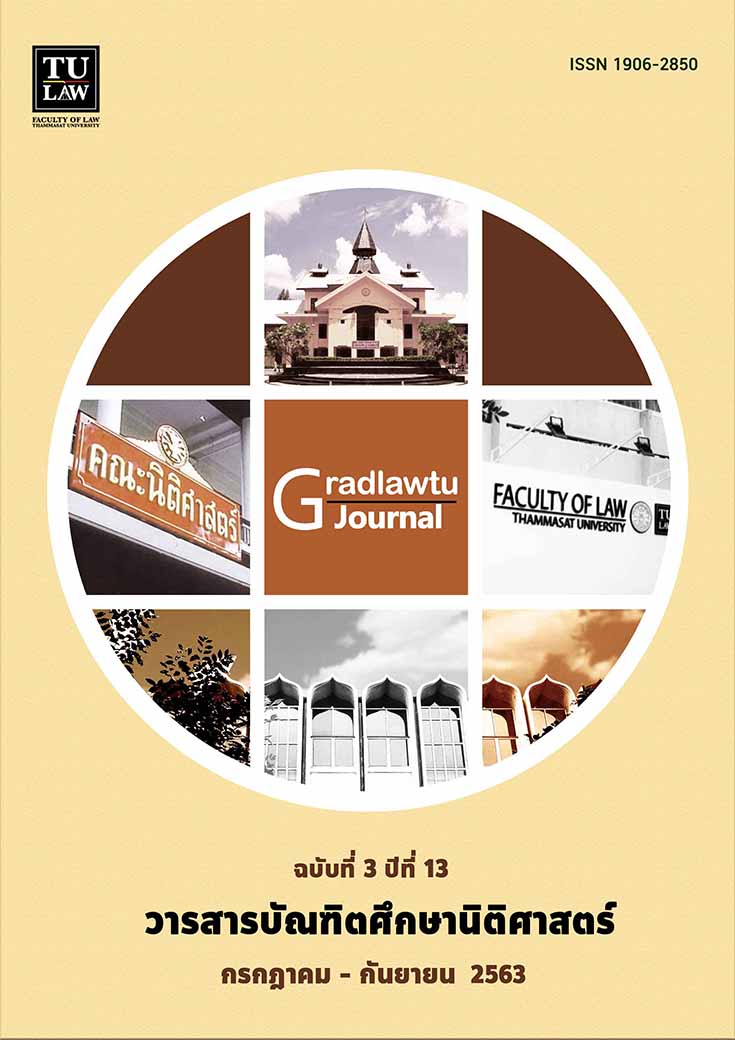การกัดกร่อนฐานภาษีเงินได้และการโยกย้ายเงินกำไรไปต่างประเทศโดยอาศัย องค์กรและตราสารทางการเงินลูกผสมในประเทศไทย
บทคัดย่อ
บทความนี้มุ่งศึกษาปัญหาเรื่องการกัดกร่อนฐานภาษีและการโยกย้ายเงินกำไรไปต่างประเทศที่เกิดขึ้นจากการจัดการหรือธุรกรรมระหว่างประเทศที่เกิดขึ้นโดยอาศัยองค์กรและตราสารทางการเงินลูกผสม อันเกิดขึ้นจากการรับรู้สถานะขององค์กรและประเภทของตราสารทางการเงินที่แตกต่างกันตามกฎหมายภายในของประเทศซึ่งองค์กรคู่สัญญามีถิ่นที่อยู่ ส่งผลให้การปรับใช้กฎหมายภาษีเพื่อจัดเก็บภาษีเงินได้จากองค์กรและตราสารนั้นแตกต่างกัน อันจะกระทบต่อการรับรู้รายได้และรายจ่ายที่เกิดขึ้นภายใต้องค์กรและตราสารดังกล่าว ส่งผลให้ไม่เป็นไปตามหลักการจับคู่รายได้และรายจ่าย (Matching Principle) และก่อให้เกิดเป็นการจับคู่ผิดพลาดจากการรับรู้รายได้และรายจ่ายขึ้น ซึ่งเป็นปัญหาสำคัญที่เกิดผลกระทบขึ้นแก่หลายประเทศทั่วโลก ทำให้ประเทศที่ควรจะสามารถจัดเก็บภาษีจากนิติบุคคลข้ามชาติไม่สามารถเก็บภาษีหรือจัดเก็บภาษีได้ในจำนวนที่ต่ำเกินควร ทำให้สูญเสียรายได้จากทั่วโลกถึงประมาณ 100 ถึง 240 พันล้านเหรียญสหรัฐต่อปี ทั้งการดำเนินการภายใต้การจัดการหรือธุรกรรมระหว่างประเทศโดยอาศัยองค์กรและตราสารทางการเงินลูกผสมยังมีผลกระทบต่อหลักการจัดเก็บภาษีอากรที่ดี รวมถึงการแข่งขันทางเศรษฐกิจด้วย จากประเด็นปัญหาข้างต้น ผู้เขียนจึงเลือกศึกษาแนวทางในการแก้ไขปัญหาของ OECD กฎหมายภายในของประเทศออสเตรเลีย และประเทศสหรัฐอเมริกา ซึ่งได้มีการปรับใช้บทบัญญัติเพื่อแก้ไขปัญหาดังกล่าวอย่างเป็นรูปธรรม โดยแนวทางของ OECD และบทบัญญัติของประเทศออสเตรเลียมีลักษณะเป็นบทบัญญัติที่สอดคล้องกับหลักความเป็นธรรมและหลักความเป็นกลาง และบทบัญญัติของสหรัฐอเมริกาเป็นบทบัญญัติไว้อย่างเรียบง่าย เพื่อเป็นแนวทางในการแก้ไขปัญหาในประเทศไทย และจากผลการศึกษาผู้เขียนจึงเสนอให้มีการปรับแก้ไขกฎหมายภาษีภายในเพื่อแก้ไขปัญหาดังกล่าวในประเทศไทยด้วย
เอกสารอ้างอิง
2. คณะกรรมการกำกับการดำเนินโครงการศึกษาและพัฒนาประมวลรัษฎากร. “ปัญหาและอุปสรรคในการจัดเก็บและการเสียภาษีอากรตามประมวลรัษฎากร.” http://www.rd.go.th/fileadmin/download/PramualProj/a1seminar2_3_1.pdf, 02 กรกฎาคม 2561.
3. จิรศักดิ์ ชะออน. “ภาษีเงินได้เกี่ยวกับตราสารกึ่งหนี้กึ่งทุน.” วิทยานิพนธ์มหาบัณฑิต คณะนิติศาสตร์ มหาวิทยาลัยธรรมศาสตร์, 2553.
4. สุชาติ ธนฐิติพันธ์, บทวิเคราะห์ธุรกรรมซื้อคืนภาคเอกชน (Private Repo) ในครึ่งแรกของปี 2550. http://www.thaibma.or.th/pdf/Article/Private%20Repo%20(H1_2007).pd., 2 ตุลาคม 2561
5. Australian Taxation Office. “Implementation of the OECD Hybrid Mismatch Rules,” https://www.ato.gov.au/General/New-legislation/In-detail/Other-topics/International/Implementation-of-the-OECD-hybrid-mismatch-rules/., 07 May 2018.
6. Deloitte. “BEPS Actions Implementation by Country Australia,” https://www2.deloitte.com/content/dam/Deloitte/global/Documents/Tax/dttl-tax-beps-actions-implementation-australia.pdf., 14 July 2017.
7. Gabriël van Gelder and Boudewijn Niels. Tax Treatment of Hybrid Financial Instruments, Derivatives & Financial Instruments, Netherland: IBFD, 2013
8. Jason Furman. “The Concept of Neutrality in Tax Policy,” https://www.brookings.edu/testimonies/the-concept-of-neutrality-in-tax-policy/, 23 June 2018.
9. Organization for Economic Co-operation and Development. Neutralising the Effects of Hybrid Mismatch Arrangements, Action 2: 2014 Deliverable. Paris: OECD Publishing, 2014
10. Organization for Economic Co-operation and Development. Neutralising the Effects of Hybrid Mismatch Arrangements, Action 2-2015 Final Report. Paris: OECD Publishing, 2015
ดาวน์โหลด
เผยแพร่แล้ว
ฉบับ
ประเภทบทความ
สัญญาอนุญาต
บทความหรือข้อความคิดเห็นใด ๆ ที่ปรากฏในวารสารบัณฑิตศึกษานิติศาสตร์เป็นความรับผิดชอบของผู้เขียนบทความโดยเฉพาะ คณะนิติศาสตร์ มหาวิทยาลัยธรรมศาสตร์ และกองบรรณาธิการไม่จำเป็นต้องเห็นด้วย



